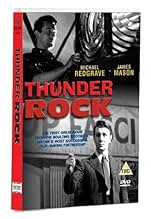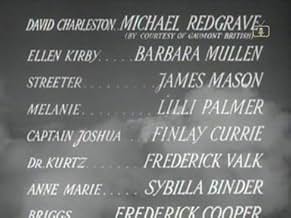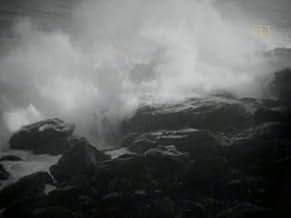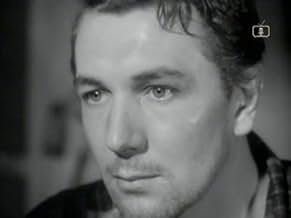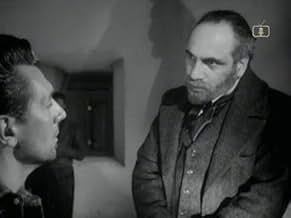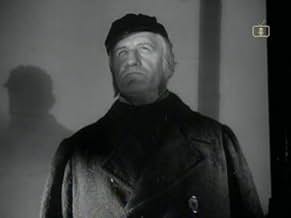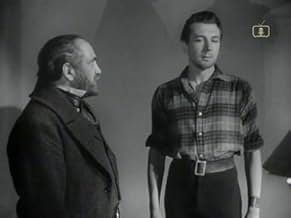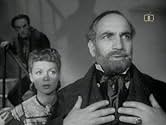Añade un argumento en tu idiomaCynical, embittered newspaperman David Charleston (Michael Redgrave) is tormented, then inspired, by visions he keeps having of people who have drowned.Cynical, embittered newspaperman David Charleston (Michael Redgrave) is tormented, then inspired, by visions he keeps having of people who have drowned.Cynical, embittered newspaperman David Charleston (Michael Redgrave) is tormented, then inspired, by visions he keeps having of people who have drowned.
- Premios
- 1 premio en total
Bryan Herbert
- Flanning
- (as Brian Herbert)
Argumento
¿Sabías que...?
- CuriosidadesFinlay Currie (Captain Joshua) repeated his role in a 1955 television adaptation of the play.
- PifiasDuring the flashback sequence, when "Briggs" walks back into the room to his family, a crew member's hand can be seen outside the door stopping it from slamming shut.
- ConexionesReferenced in Jennie (1948)
Reseña destacada
I saw this movie in 1942, when I worked for the War Department and had just enlisted in the Army Air Corps, so this might account for the strong memories I have of it.
I was a little shocked that it seemed almost pure propaganda. However, it was clearly made for a British audience at a time when the nation was in imminent danger of invasion by the Nazis. Its message was never to give up hope.
It opens with the hero being frightened by the spread of Fascism across Europe. He goes into a London movie house where the depressing newsreel is followed by a cartoon which the unthinking audience finds hilarious. Disgusted, he gives up and withdraws into himself. He becomes a sort of hermit and somehow gets a job as a lighthouse-keeper on the Great Lakes.
Browsing through the lighthouse's log, he finds an account of a shipwreck. As he reads, the viewer notices that the lighthouse's central pole is now at an angle--a very clever hint of the transition to the fantasy now taking place. He is now on board the sinking ship and all is confusion and despair. But it turns out OK--the first example of the message (to the English) not to give up hope.
There are several other such episodes including one about the doctor in Vienna who discovers that doctors not washing their hands is how the deadly childbirth fever infection is spread. A failure, he is laughed out of town. But a few years later his radical theory is proved correct. Another morale boost for the discouraged wartime English.
I can't remember how the movie ends--but I've never forgotten the movie!
I was a little shocked that it seemed almost pure propaganda. However, it was clearly made for a British audience at a time when the nation was in imminent danger of invasion by the Nazis. Its message was never to give up hope.
It opens with the hero being frightened by the spread of Fascism across Europe. He goes into a London movie house where the depressing newsreel is followed by a cartoon which the unthinking audience finds hilarious. Disgusted, he gives up and withdraws into himself. He becomes a sort of hermit and somehow gets a job as a lighthouse-keeper on the Great Lakes.
Browsing through the lighthouse's log, he finds an account of a shipwreck. As he reads, the viewer notices that the lighthouse's central pole is now at an angle--a very clever hint of the transition to the fantasy now taking place. He is now on board the sinking ship and all is confusion and despair. But it turns out OK--the first example of the message (to the English) not to give up hope.
There are several other such episodes including one about the doctor in Vienna who discovers that doctors not washing their hands is how the deadly childbirth fever infection is spread. A failure, he is laughed out of town. But a few years later his radical theory is proved correct. Another morale boost for the discouraged wartime English.
I can't remember how the movie ends--but I've never forgotten the movie!
- albertsanders
- 1 jun 2007
- Enlace permanente
Selecciones populares
Inicia sesión para calificar y añadir a tu lista para recibir recomendaciones personalizadas
Detalles
- Fecha de lanzamiento
- País de origen
- Idioma
- Títulos en diferentes países
- The Charter Film Production of Thunder Rock
- Localizaciones del rodaje
- D&P Studios, Denham, Uxbridge, Buckinghamshire, Inglaterra, Reino Unido(studio: made at D & P Studios Denham - England)
- Empresa productora
- Ver más compañías en los créditos en IMDbPro
- Duración1 hora 52 minutos
- Color
- Relación de aspecto
- 1.37 : 1
Contribuir a esta página
Sugerir un cambio o añadir el contenido que falta

Principal laguna de datos
By what name was Thunder Rock (1942) officially released in Canada in English?
Responde
